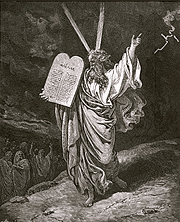Thoughts on Poverty of Spirit - 2
So how could it be that Christians would become proud? Having started with nothing, how could receiving freely give us reason to boast? It seems that pride is the sneakiest of all sins, working from the core of the heart, seeking any opportunity to morph and reappear undetected.
I think the first step in losing poverty of spirit is losing sight of who God is and what he demands.
The two most famous theophanies seem to be Moses on Sinai and Isaiah's vision in the year that Uzziah died. With everything in me, try as I might, I can't imagine a way that a person could remain proud in those circumstances. Even Moses, with whom God would speak(!) could not see him or else he would die.
In Isaiah's vision even the creatures around Jesus' throne could not look upon him, but were forced to cover both their faces and their feet. When Christians fail to recognize that it is a terrifying thing to fall into the hands of the living God who is a consuming fire, we cease to lose touch with the God of the Bible. When we forget that we ought rightly to be afraid of him, we are venturing toward pride.
But not only do we need to remember who God is, but we also need to remember what he demands of us. Throughout the Old Testament God thundered down the Law and declared through the prophets, 'Be holy, as I am holy! It startles me to think that we as Christians can be so easy on our sin when we read this. Do we not realize what it says? And it is not merely an 'Old Testament' thing, either! Jesus declares that we must 'Be perfect as your heavenly Father is perfect.'
In other words, the standard is God. Now, if you haven't rightly evaluated who God is, that's not that big of a deal. But if you have truly seen the God of the Bible for who he is, and then have realized that he himself is the standard, then you realize quite quickly why exactly Isaiah cried out 'woe is me!' and why Paul could so brazenly say 'all have fallen short of the glory of God' because all have broken the law. The law is not the standard... the law bears witness to the standard, but the standard is God himself!
I may think that I measure up okay in my Christian life... I don't sin openly. I've read more books than other Christians (and better books too!). I go to church all the time, I teach Sunday school, all my friends are Christians... But in reality, how I measure up against other Christians is never, ever used as a realistic standard by which we ought to measure ourselves.
If we evaluate ourselves against others around us we might think we're doing alright. In reality, however, we ought to be measuring ourselves against God, because he is what he demands from us, and nothing less.
Honestly comparing ourselves to the God of the Bible should produce poverty of Spirit where nothing else will. Once again, our greatest need is to turn to the word of God, to behold God, to know him for who he is. Only that will make us who and what we need to be.
.jpg)









